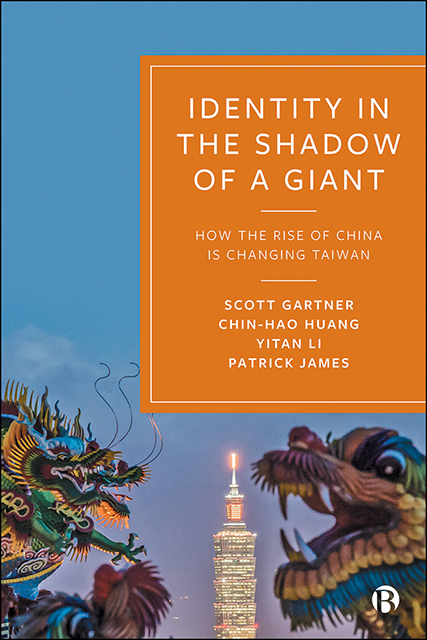Book contents
- Frontmatter
- Dedication
- Contents
- List of Figures and Tables
- About the Authors
- Acknowledgements
- Preface
- 1 Identity in the Shadow of a Giant: How the Rise of China Is Changing Taiwan
- 2 Taiwan in Historical Perspective
- 3 The Problématique of Taiwanese Identity
- 4 Theorizing about Identity, Change in Capabilities and Dyadic Relations: An Approach Based on Analytic Eclecticism and Systemism
- 5 Elite Reflections
- 6 Popular Reflections (Survey I)
- 7 Factors Influencing Identifying Only as Taiwanese: A Layered Empirical Approach (Survey II)
- 8 A New Vision of Taiwanese Identity, the Rise of China, Cross-Strait Relations and the United States in Northeast Asia
- Appendix A Research Interview Questions, September–October 2015
- Appendix B Taiwanese Identity and the Rise of China: Survey Questions, 27 October 2015
- Appendix C Taiwan National Security Survey by Emerson Niou
- References
- Index
Appendix A - Research Interview Questions, September–October 2015
Published online by Cambridge University Press: 15 April 2023
- Frontmatter
- Dedication
- Contents
- List of Figures and Tables
- About the Authors
- Acknowledgements
- Preface
- 1 Identity in the Shadow of a Giant: How the Rise of China Is Changing Taiwan
- 2 Taiwan in Historical Perspective
- 3 The Problématique of Taiwanese Identity
- 4 Theorizing about Identity, Change in Capabilities and Dyadic Relations: An Approach Based on Analytic Eclecticism and Systemism
- 5 Elite Reflections
- 6 Popular Reflections (Survey I)
- 7 Factors Influencing Identifying Only as Taiwanese: A Layered Empirical Approach (Survey II)
- 8 A New Vision of Taiwanese Identity, the Rise of China, Cross-Strait Relations and the United States in Northeast Asia
- Appendix A Research Interview Questions, September–October 2015
- Appendix B Taiwanese Identity and the Rise of China: Survey Questions, 27 October 2015
- Appendix C Taiwan National Security Survey by Emerson Niou
- References
- Index
Summary
1. To what degree is Taiwanese identity shaped and influenced by the rate of China's military modernization?
a. To what degree is Taiwanese identity shaped and influenced by China's economic development?
b. What implications does the change in the Beijing's capabilities have for political economy?
c. For security?
2. How do these external factors (in Question 1) affect Taiwan's rate of democratization? Any specific examples?
3. Would cross-Strait economic and security policy be seen as constituency-driven or constituency-constrained?
4. What is the general public mood on cross-Strait relations?
a. How will this mood determine the way presidential candidates present their policy towards Beijing?
5. How relevant is the ‘1992 Consensus’ as the basis for future developments in cross-Strait relations?
a. How does the evolving Taiwanese identity affect the continued relevance of the ‘1992 Consensus?’
6. Do you agree that there seems to be a diverging trend in cross-Strait relations, where there is increasing economic integration and interdependence all the while political fragmentation remains persistent?
7. Looking ahead, how might a DPP-or a KMT-government strike deals with Beijing without upsetting their domestic constituencies?
8. What are some of the emerging results – benefits and costs – of the Economic Cooperation Framework Agreement (ECFA)?
9. Is the government ensuring that the agreement's benefits are more widely diffused to a broader spectrum of Taiwanese society (eg small and medium enterprises, labour unions, manufacturing and agriculture)?
a. If so, how and if not, why not?
10. Have disadvantaged domestic constituents complicated the cross-Strait negotiation process?
11. What role might the United States play in the evolving situation in cross-Strait relations?
12. Under what conditions do you think the United States will more (or less) likely honour its security commitments under the Taiwan Relations Act?
- Type
- Chapter
- Information
- Identity in the Shadow of a GiantHow the Rise of China is Changing Taiwan, pp. 213 - 214Publisher: Bristol University PressPrint publication year: 2021



